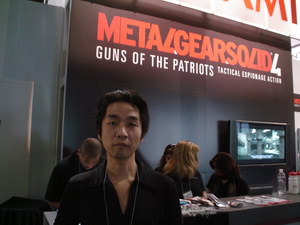E for All 07: Interview with Akira Yamaoka (Wired News)Date published: 2010.03.12
The reason why is that the upcoming Silent Hill 5 will be multiplatform, and the game sells best outside of Japan, where Xbox 360 is more popular. "Overseas players are about 80% of our sales," he says. Below is the full text of our chat with Yamaoka at E For All — we cover making Silent Hill with a UK-based development group (there’s a lot of emails), how to scare people with music, why Yamaoka thinks PSP sales will pick up, and the potential of Silent Hill on Wii. Wired News: I admit that haven’t played a lot of Silent Hill before, but I’ve been playing the PSP version and am really struck by the use of sound. How do you think your job differs from that of other people who do sound for video games? I feel like you take it much more seriously. Akira Yamaoka: When I make music for Silent Hill, I don’t really think about making music for games. Silent Hill is a horror game, and I want people to be scared. But at the same time I like to convey the message. So I don’t really think about making this music for this stage… I try to think about what message we want to convey to the players. WN: Give me an example of how you might use a certain type of music to convey a message. Yamaoka: For example, the battle scenes. There’s a certain genre of "combat scene" music, but instead of using combat music I think about what the character is thinking about and what made him get into a fight. So I don’t really use combat music just because it’s a combat scene. WN: So what instruments, what kind of feeling do you try to evoke with combat scenes? Yamaoka: So it’s not like orchestrated or anything. I try to make it dramatic, a different type of music. WN: If you’re really trying to scare somebody with music, make their heart stop, what’s something you do to do that? Yamaoka: The normal way is to use strong music for an attack scene or a surprise scene, but I normally use that type of music and also make sudden silences, too, or use very soft music. So I try not to make a pattern that the user will get used to. I want to make variations that users cannot anticipate. WN: You’ve been doing this for a while: are there any techniques that you used in the first couple of Silent Hill games that you’ve improved on now? Yamaoka: I haven’t changed very much. Silent Hill has its own feeling and atmosphere and I don’t change it. But at the same time, the platforms are changing, and we have better sound quality and capacity. So I was able to add more and different types of music. But at the same time I try not to change the technology or tools. WN: What is the workflow? Do the designers create the scenes and give them to you and you just put the music in, or do you join in with them and give them suggestions on how to design the game to work best with the sounds? Yamaoka: The second one. We work together. WN: So how does that change, then, with this most recent game? Because the developer Climax is in England, and you’re working in Japan. Yamaoka: I receive the data, and use different formats like Quicktime, for example. And that’ll be uploaded onto an FTP. And then I look at the images and work on music. At the same time I exchange emails and have a lot of discussion with them. Finally, after all the discussion, I add the music to the data. WN: Are there people in Japan working with you to program the music and put it into the data? Yamaoka: No, all the programmers are at Climax. WN: How does the game being on the PSP change the nature of it? Yamaoka: Handhelds are different from consoles, so we decided to pursue a more action-oriented game, and focus on that. WN: What else about designing a game for PSP made it so you had to change what was going on in the game? Yamaoka: In terms of mixing and such, there’s not much difference. WN: So the PSP isn’t doing very well in Japan right now — why do a PSP game? Do you think it has a chance to sell? Yamaoka: In terms of technology, it’s impossible to fit a Silent Hill type of game into the DS format. In terms of the handheld market, DS is much bigger. But with the Light/Slim version, PSP sales are picking up. So that’s why we chose PSP. WN: What is the future of the Silent Hill series? Yamaoka: We’re making Silent Hill 5 for next-gen consoles. Are there any other platforms besides that? [laughter] WN: There’s the Wii. Yamaoka: Ah, the Wii. Wiiiiiiiiii… Silent Hill Wii. Can we do it? Will players like it? WN: Yeah! There’s a lot of potential there, using the remote as a flashlight, or a knife… Yamaoka: Yeah, there’s potential. WN: But no plans. Yamaoka: No plans. The Wii user isn’t a hardcore user. WN: What do you think of the WIi vs. PS3 right now — do you think that PS3 will start doing better because of its users being more hardcore? Yamaoka: Hmm. If Sony makes it easier for creators to create games for PS3, I think it will pick up. It depends on Sony’s programming tools. WN: A lot of developers say that it’s too expensive unless they’re doing multiplatform. Do you see Silent Hill being multiplatform from here on out? Yamaoka: Yes. It’s more challenging, but if we can do it, we’re going to. WN: How important is the foreign market right now to the Silent Hill series? Yamaoka: Overseas players are about 80% of our sales. It’s a lot more popular outside Japan. WN: With that in mind, do you think that the 360 version of Silent Hill 5 will be the most popular? Yamaoka: Yes, I believe so. |

